What used to take an entire development sprint now ships in a single afternoon.
The numbers prove it: according to Stack Overflow's 2024 Developer Survey of over 65,000 developers, 76% are now using or planning to use AI coding assistants in their development process—up from 70% the previous year.
The shift from "AI is a novelty" to "AI is how developers code" happened faster than anyone predicted. Today's AI code generation tools aren't just AI powered code completion on steroids - they're collaborative partners that understand context, write tests, refactor codebases, handle documentation generation, and even automate repetitive tasks.
Whether you're a senior developer looking to accelerate complex projects with advanced AI capabilities or a junior developer wanting to level up your skills with intelligent code assistance, below is an up-to-date, developer-focused guide to the best AI for coding across every category that matters.
Think of these as your always-available senior developers who never judge your questions and actually remember what you discussed yesterday. They excel at architecture discussions, debugging sessions, code explanation, and those "how the hell do I..." moments that would normally eat up half your day.

Anthropic's Claude has become the go-to code assistant for developers who need deep, contextual conversations about code. It excels at maintaining context across lengthy coding discussions and provides detailed explanations that help you understand what the generated code does and why it's structured that way.
Key features:
- Solid long-context retention - discuss complex refactoring without constant re-explanation
- Thoughtful code reviews that catch edge cases in existing code, not just syntax errors
- Strong debugging assistance with step-by-step reasoning for fixing code
- Real-time web search for current best practices and documentation
- Natural conversation flow that understands implied context and natural language description
- Supports multiple languages and frameworks
Pricing: Free version available, Pro at $20/month, Max from $100/month, Team at $25/month, Enterprise available
The tool that started the revolution keeps pushing boundaries. ChatGPT remains the Swiss Army knife of AI assistants - equally comfortable explaining Python code to juniors or architecting distributed systems with principals.
Key features:
- Fluent in 50+ programming languages with deep framework knowledge
- GPT-4o's improved reasoning catches what you meant, not just what you typed
- Web browsing ensures advice isn't based on deprecated practices
- AI code generation that follows modern patterns and best practices
- Excellent at translating between technical and non-technical explanations
- Intelligent code suggestions for basic tasks and complex algorithms alike
Pricing: Free version available, Plus at €23/month, Pro at €229/month, Team at €29/user/month, Enterprise available
Google's late entry with Gemini proved worth the wait. It brings multimodal capabilities and advanced reasoning to coding tasks, offering a fresh perspective on technical problem-solving. The Google ecosystem integration works exactly as you'd expect for Workspace users, but even outside that bubble, it delivers strong performance on algorithmic problems with quick, accurate code suggestions. The free version is generous enough for real work.
Pricing: Free version available, Google AI Pro at €21.99/month
These AI powered coding assistants support multiple programming languages and can handle various programming tasks. All three offer free tiers with daily limits. When you hit the limit with one, simply switch to another for continued code assistance. It's only a matter of finding which one fits your workflow best.
These represent the cutting edge of AI coding tools that go beyond assistance to actual autonomous work. ADEs can manage multiple files simultaneously and handle end-to-end development workflows, fundamentally changing how we approach complex development tasks.
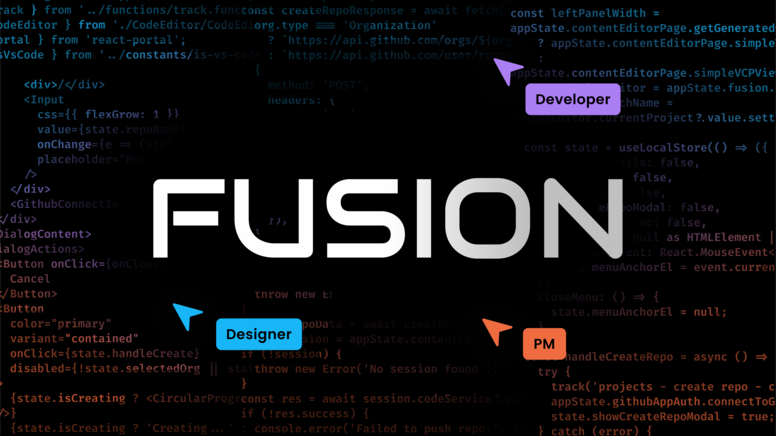
Fusion (from us) takes a new approach as the first truly visual Agentic Development Environment. Instead of design-to-code translation, it creates a shared visual language where design and code are different views of the same truth.
Key features:
- Existing code integration - connect any GitHub repo and work with your codebase
- Design system intelligence that learns your patterns and enforces consistency in AI generated code
- Visual editing with code precision - edit components, CSS, and layouts visually while maintaining source code integrity
- Agentic PR workflow - @builder-bot responds to feedback, fixes build failures, and iterates automatically
- Rich Figma integration - import designs that map properly to your existing design system
- VS Code extension for seamless IDE integration with full visual development capabilities
- Multi-format context support and MCP support for universal tool integrations
Pricing: Free version available, Pro at $24/month, Enterprise custom pricing
For terminal enthusiasts, Claude Code brings intelligent code assistance directly to the command line. Anthropic has worked Claude's reasoning capabilities directly into terminal workflows without sacrificing the power and flexibility developers expect. Claude code extension is also available for use in your code editors.
Key features:
- Full codebase context awareness and smart navigation across multiple files
- Permission-based command execution with transparent reasoning
- Automated Git workflows including conflict resolution
- Test generation and execution with automatic failure diagnosis and fixes
- MCP server integration for extended capabilities
- Enterprise-ready security with audit trails
- Suggesting fixes for common errors
Pricing: Pro at $20/month, Max from $100/month
Codex CLI, OpenAI's command-line interface provides developers with direct access to advanced AI code generation models. It offers terminal-native AI assistance with context preservation, multi-language support, and integration with existing development tools.
Pricing: Usage-based API pricing.
Gemini CLI, Google's command-line AI tool leverages multimodal capabilities for comprehensive development assistance, supporting code screenshots and more. The Google Cloud integration is solid if you're in that ecosystem, and the token efficiency keeps costs down for teams watching their AI spend.
Pricing: Free version with 60 requests/minute and 1,000 requests/day, usage-based billing via Google AI Studio/Vertex AI for higher usage
The familiar editor experience enhanced with AI capabilities. These tools integrate intelligence directly into your existing workflow without forcing dramatic changes, providing real time code suggestions as you type.
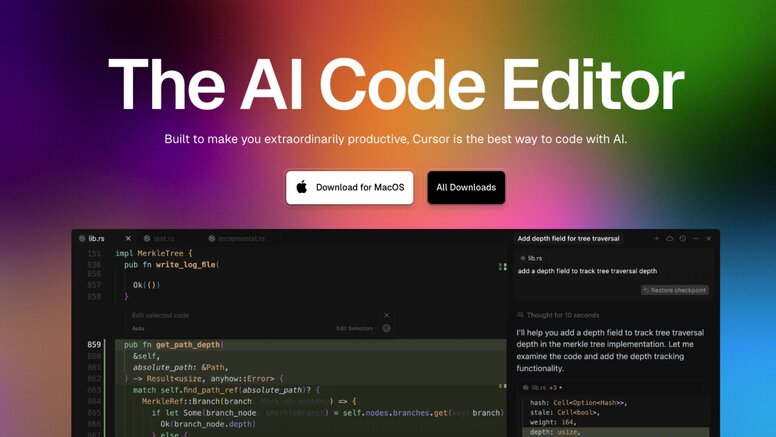
Purpose-built for AI-assisted development, Cursor has become the gold standard for developers ready to fully embrace AI pair programming workflows. Every feature feels designed for developers who want AI as a first-class citizen, not an afterthought. It excels at understanding existing code and generating new code that fits seamlessly.
Key features:
- Multi-file context awareness that understands project structure
- Composer Mode for complex, codebase-wide refactoring
- Background agents working autonomously while you focus elsewhere
- Custom AI model selection (Claude, GPT-4, Gemini) based on task
- New web interface for managing multiple AI agents simultaneously
- Privacy mode ensuring code written never trains models
- Advanced code completion and suggest code features
Pricing: Free hobby tier with limited usage, Pro at $20/month, Ultra at $200/month, Teams at $40/user/month, Enterprise custom pricing
By the way, check out these awesome Cursor tips!
Codeium's IDE Windsurf offers a clean, distraction-free UI optimized for AI workflows. Where it wins is simplicity - the learning curve is gentle, and the UI doesn't bombard you with options. It's the middle ground between full AI immersion and traditional coding, perfect for developers just getting started with AI powered coding assistant features.
Pricing: Free version available, Pro at $15/user/month, Teams at $30/user/month, Enterprise starting at $60/user/month
Microsoft's Visual Studio Code approach is different - enhance through ecosystem rather than rebuild. The marketplace offers dozens of VS Code extension options, letting you create your perfect setup. GitHub Copilot remains the most popular VS Code extension, but you can mix and match providers based on your needs. This flexibility is both a strength and weakness - you get exactly what you want, but it requires more setup than integrated solutions. For developers already deep in the Visual Studio Code ecosystem, it's the path of least resistance.
The VS Code extension marketplace offers various AI coding assistants (Cline) that provide intelligent code suggestions and code assistance directly in your editor. Popular extensions support multiple programming languages and offer features like code sharing and collaborative editing.
Pricing: GitHub Copilot free version available, Pro at $10/month, Pro+ at $39/month, Business at $19/user/month, Enterprise at $39/user/month)
ByteDance's IDE Trae brings interesting ideas to AI-assisted development. The dual-mode system - Builder for natural language description app generation, Chat for interactive assistance - acknowledges that different tasks need different interfaces. Currently powered by Claude 3.7 Sonnet and GPT-4o (multiple models), it delivers solid performance with a clean interface that doesn't get in the way. Perfect for basic tasks and complex projects alike.
Pricing: Free version available, Pro at $3 first month then $10/month
When speed trumps everything else. These tools excel at going from idea to deployed application in hours, perfect for MVPs, demos, and rapid prototyping using AI code generation.
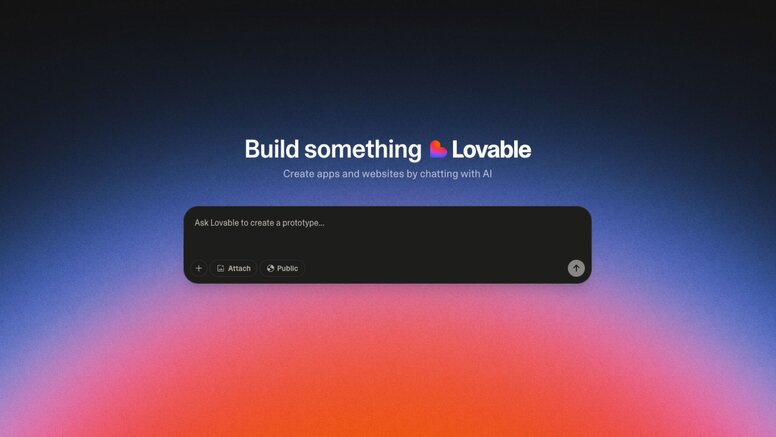
By focusing exclusively on React applications with Supabase backends, Lovable perfected one very specific workflow. The constraints become strengths - less decision paralysis, faster results. The generated code is consistently clean and follows best practices.
Key features:
- Specialized React development with modern best practices
- Integrated Supabase backend (database, auth, functions)
- One-click deployment with custom domains
- Consistent, production-ready AI generated code output
- UI generation from Figma designs
- Handles source code management efficiently
Pricing: Free version available, Pro at $25/month, Enterprise custom pricing
StackBlitz's Bolt offers more flexibility with multi-framework support. The embedded IDE experience means you're never far from diving into the code written when AI needs human intervention. Excellent for rapid prototyping with functional code output.
Key features:
- Support for React, Vue, Svelte, Expo and more (multiple programming languages)
- Full IDE experience with smart debugging
- Netlify deployment integration that just works
- AI-powered error resolution and suggesting fixes
- Real-time preview alongside code editing
- Built-in code fork capabilities
Pricing: Free version available, Pro at $20/month, Teams at $30/user/month
The task every developer avoids is finally automated. Modern documentation generation tools don't just generate - they maintain, update, and help users find information.
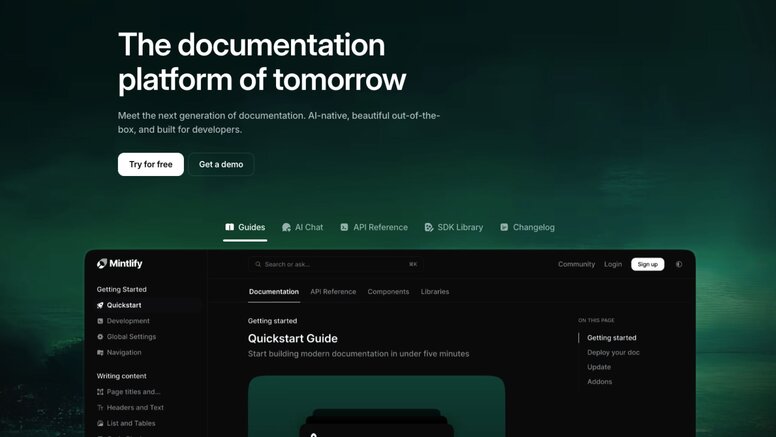
Mintlify reimagined documentation as a living system rather than static pages. The combination of automated generation, intelligent search, and usage analytics creates documentation that actually helps users and reduces repetitive code explanations.
Key features:
- Automated generation from source code with smart parsing
- AI chat trained on your specific documentation
- Git integration for automatic updates with version control
- Analytics showing what users search for and where they struggle
- Multi-model support (Claude, GPT, Gemini, Llama)
- Beautiful, responsive templates
- Enterprise security with SOC 2 compliance
Pricing: Free hobby tier available, Pro at $180/month, Growth at $650/month, Enterprise custom pricing
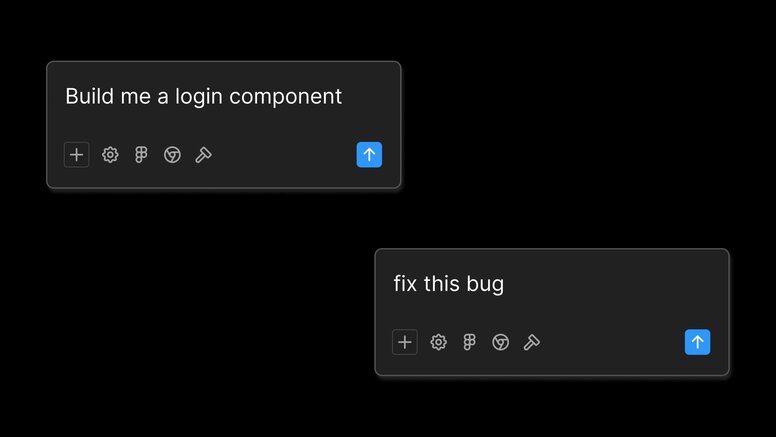
The most fundamental mistake developers make when using AI coding assistants is treating prompting like writing a quick task description. Commands like "build me a login component" or "fix this bug" followed by expecting magic to happen rarely produce optimal results.
Effective AI coding requires context engineering, which is both an art and a science.
The art part: Understanding AI psychology. It's knowing how to structure prompts so the AI thinks through problems step by step, when to be specific versus creative, and how to break complex problems into smaller chunks.
The science part: You need to give the AI the right information in the right format. That means task descriptions, examples of good output, relevant code from your project, error logs, and your coding standards. Too little context and the AI doesn't have enough to work with. Too much irrelevant context wastes tokens and hurts performance.
The difference between a one-liner and a well-engineered prompt is often the difference between mediocre AI generated code and something that saves hours of work through proper code assistance.
These tools represent the current state of AI-assisted development, but choosing the best AI for coding depends on your specific needs. The pace of change means today's cutting-edge becomes tomorrow's table stakes. The evolution from simple code completion to intelligent code suggestions to fully autonomous AI pair programming happened rapidly.
What remains constant is the need for developers to understand not just how to use these AI models, but when and why to use them. Whether you're working with Python code, JavaScript, or any of the multiple programming languages supported by modern tools, finding the best AI for coding means balancing AI assistance with human expertise.
Whether you're building your next side project or leading a development team, Fusion adapts to make you more productive from day one with advanced AI capabilities that understand your code development workflow.
Try Fusion today and see how visual agentic development can transform your workflow with real time code suggestions and intelligent code assistance.
Builder.io visually edits code, uses your design system, and sends pull requests.
Builder.io visually edits code, uses your design system, and sends pull requests.



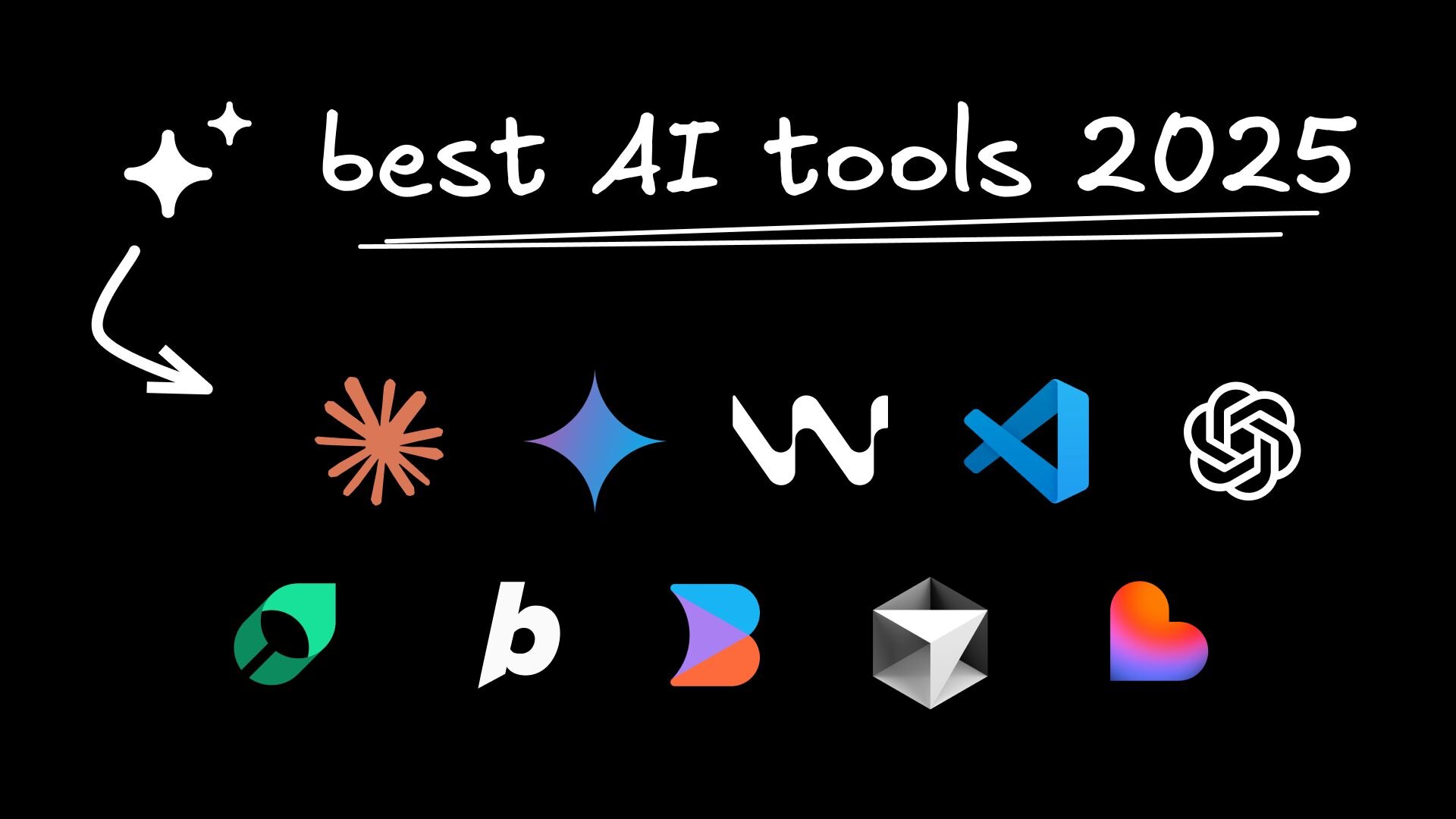
 Connect a Repo
Connect a Repo











